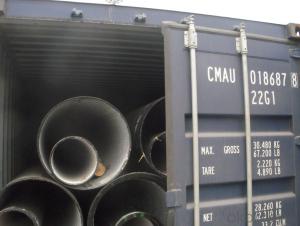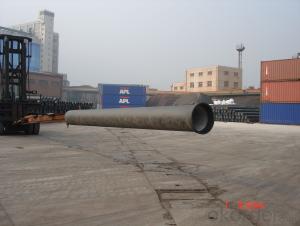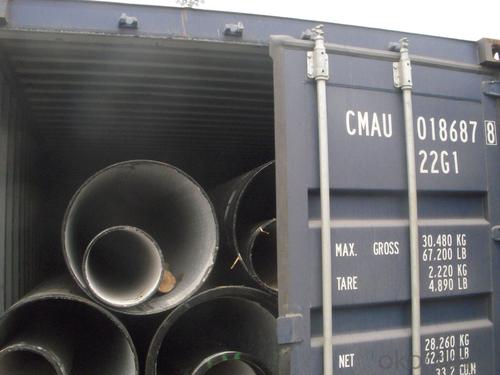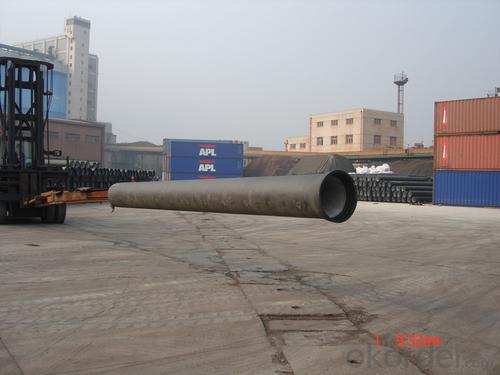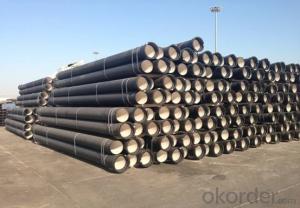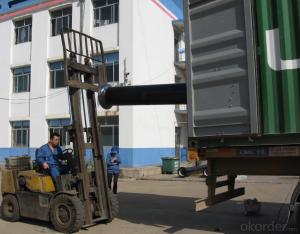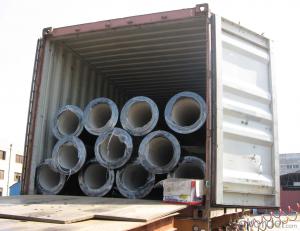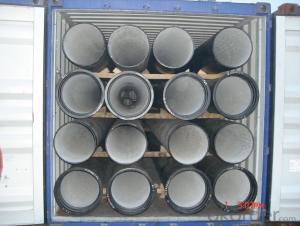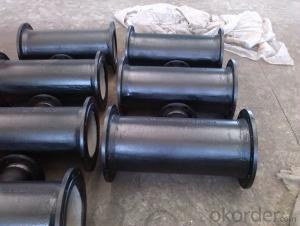DUCTILE IRON PIPES C Class DN1600
- Loading Port:
- China Main Port
- Payment Terms:
- TT OR LC
- Min Order Qty:
- -
- Supply Capability:
- -
OKorder Service Pledge
OKorder Financial Service
You Might Also Like
Ductile Iron Cast Pipe is without any defects compare with tradition casting tech, which has many advantages particularly as follow:
(1) High density. In the "vertical upward casting" process, the melt iron of centre liquid column in center crystallizer is continuously feeding for volume shrinkage caused by condensation tube at outer circumference , which lead to be free of shrinkage porosity.
(2) High purity. When melt iron pouring, the mixed impurities such as gas, dross, sand grain which are lighter than melt iron could be eliminated at furnace mouth, its impossible to enter into the crystallizer through the channel, so the melt iron into the crystallizer is very pure.
(3) Strength with toughness. The cooling speed provided by continuous crystallizer is 30 times than sand casting and 5 times than centrifugal casting, and doesn't produce white iron, the eutectic cell volume of continuous cast iron is one eighth to one tenth compare with traditional cast iron. The density of graphite nodule in ductile iron can reach 300-700 pcs/mm2. Therefore, all reason above improve the strength and toughness of continuous cast iron.
(4) Free machining. The high speed cooling make the hardening phase (such as boride, steadite) not appear like reticular, massive or thick, but diffuse like fish bone and pane in shape, moreover, there are tiny graphite flakes inlaid hardening phase. It's free machining in BrinellHardness the range of 250-300HB. However, the Brinell Hardness of 250 is top limit to common metal materials.
(5) Uniform composition of tube wall. The convection mixing of liquid column caused by marching type drawing in crystallizer make the composition of tube wall well-distributed, and concentration gradient very little.
(6) High productivity. To the wall thickness of tube under 10mm, the speed of continuous casting is 1 meter/min, to the wall thickness of tube under 20mm, the speed of continuous casting is 0.5 meter/min, which is high efficiency that centrifugal or other casting tech couldn't reach.
- Q: How does ductile iron pipe perform in seismic conditions?
- Ductile iron pipe is known for its excellent performance in seismic conditions. It has proven to be a reliable and durable choice for underground water and wastewater systems, especially in areas prone to earthquakes. The inherent strength and flexibility of ductile iron pipe make it highly resistant to seismic forces. It can withstand ground movements and vibrations caused by earthquakes without significant damage or failure. This is due to its unique composition, which includes a high percentage of iron combined with small amounts of carbon and other alloying elements. The ductile iron pipe's ability to absorb and dissipate seismic energy through its inherent flexibility is crucial in seismic conditions. When the ground shifts during an earthquake, the pipe can adjust and deform slightly to accommodate the movement, thus minimizing stress concentrations and the risk of fractures. Moreover, ductile iron pipe has excellent joint integrity, which is vital in seismic conditions. The joints are designed to provide maximum strength and resistance against external forces, including seismic activity. Various joint types, such as push-on, mechanical, and restrained joints, are available to suit different seismic requirements and installation conditions. In addition to its mechanical properties, ductile iron pipe also offers long-term corrosion resistance. It is typically lined with a cement mortar or a protective coating, which acts as a barrier against corrosive elements in the soil or water. This corrosion resistance ensures the pipe's structural integrity and longevity, even in areas with high seismic activity. Overall, ductile iron pipe has a proven track record of performing exceptionally well in seismic conditions. Its strength, flexibility, joint integrity, and corrosion resistance make it a reliable choice for underground infrastructure, providing safe and efficient water and wastewater systems in earthquake-prone regions.
- Q: How do ductile iron pipes handle heavy traffic loads?
- Ductile iron pipes possess exceptional durability and have the ability to effortlessly withstand heavy traffic loads. This is primarily attributed to their remarkable strength and flexibility. The incorporation of graphite nodules in the composition of ductile iron allows for greater flexibility compared to traditional cast iron pipes. This enhanced flexibility empowers the pipes to endure substantial traffic loads, including the weight of vehicles traversing over them. Moreover, ductile iron pipes exhibit an elevated load-bearing capacity, enabling them to bear significant weights without experiencing any deformation or structural failure. Consequently, they are well-suited for deployment in areas characterized by heavy traffic, such as highways, bridges, and industrial sites. Furthermore, ductile iron pipes showcase exceptional resistance to external forces, such as vibrations and impacts. These pipes can effectively absorb and distribute these forces across the entire pipe network, thereby averting any potential damage and preserving the overall structural integrity. In conclusion, ductile iron pipes are explicitly engineered to manage the demands imposed by heavy traffic loads. Their strength, flexibility, and load-bearing capacity render them a dependable choice for infrastructure projects where durability and longevity are of utmost importance.
- Q: How are ductile iron pipes protected against interior corrosion?
- Ductile iron pipes are protected against interior corrosion through a process known as cement mortar lining. This involves applying a layer of cement mortar to the interior surface of the pipe. The cement mortar acts as a protective barrier, preventing the corrosive elements in the water or fluid from coming into direct contact with the iron material. To apply the cement mortar lining, the interior surface of the ductile iron pipe is first prepared by removing any loose scale or debris. Then, a cement mortar mixture is prepared by combining cement, sand, and water to form a paste-like consistency. This mixture is then applied to the pipe's interior surface using a spinning machine or manually by skilled workers. Once the cement mortar lining is applied, it is left to cure for a specific period of time, typically around 24 hours. During this curing process, the cement mortar hardens and forms a dense protective layer on the pipe's interior surface. The cement mortar lining offers various benefits in protecting ductile iron pipes against corrosion. It provides a smooth and continuous surface that prevents the water or fluid from directly contacting the iron material, reducing the risk of corrosion. Additionally, the cement mortar lining also helps to reduce the friction within the pipe, improving flow efficiency. Regular inspection and maintenance of the cement mortar lining are essential to ensure its effectiveness in preventing corrosion. Over time, the lining may develop cracks or deteriorate, which can compromise its protective properties. Therefore, it is important to periodically inspect the lining and repair or replace it as needed to maintain the integrity of the ductile iron pipes and prevent interior corrosion.
- Q: Can ductile iron pipe be used for both water and wastewater applications?
- Ductile iron pipe is versatile and can be used for water and wastewater applications. It is made by treating iron with small amounts of magnesium, resulting in a material that is both flexible and durable. This flexibility and durability make it suitable for transporting both water and wastewater. Its high strength and resistance to corrosion make it ideal for underground applications. Ductile iron pipes can handle the high pressures and varying flow rates commonly found in water distribution systems, as well as the corrosive properties of wastewater. In addition, they have a longer lifespan compared to other materials like PVC or concrete, which are commonly used for water and wastewater projects. Therefore, ductile iron pipes are often chosen for reliable and long-lasting water and wastewater transport.
- Q: How is ductile iron pipe manufactured?
- The manufacturing of ductile iron pipe involves a specific process called centrifugal casting. To start, iron is melted in a furnace and certain elements like carbon and silicon are added to achieve desired properties. Once the iron is melted, it is poured into a mold or die that is rotating at a high speed. As the molten iron is poured into the rotating mold, centrifugal force causes the liquid metal to move towards the inner surface of the mold. This force results in the metal solidifying from the outer surface inward. This creates a pipe with a dense outer layer and a more porous inner layer. The centrifugal casting process guarantees that the outer surface of the pipe is free from impurities and defects, ensuring its strength and durability. Once the pipe has solidified, it is taken out of the mold and undergoes further processing. The pipe is cleaned, excess material is trimmed, and any imperfections on the surface are eliminated. It is then given a protective coating, such as zinc or epoxy, to enhance its resistance to corrosion. The final step in the manufacturing process is quality control and testing. Ductile iron pipes go through various tests to ensure they meet the required standards. These tests include hydrostatic pressure testing, dimensional inspection, and inspection of the internal and external coating. In conclusion, ductile iron pipe is manufactured using the centrifugal casting process, which involves melting iron, pouring it into a rotating mold, and allowing it to solidify under the influence of centrifugal force. The resulting pipe is then cleaned, coated, and subjected to rigorous quality control to ensure its strength, durability, and adherence to standards.
- Q: What is the relationship between the direction of the spigot and the direction of the flow in the ductile iron pipe?
- Use more than 18 casting molten iron, by adding the spheroidizing agent, through the centrifugal ductile iron machine high-speed centrifugal casting pipe
- Q: How are ductile iron pipes connected or jointed together?
- Ductile iron pipes are typically connected or jointed together using various methods such as flanged joints, push-on joints, mechanical joints, or restrained joints. These methods ensure a secure and leak-free connection between the pipes, providing a reliable and durable pipeline system.
- Q: Can ductile iron pipe be recycled?
- Indeed, the recycling of ductile iron pipe is possible. Ductile iron, a variant of iron often employed in pipe production owing to its remarkable robustness and endurance, can be melted down when it reaches the conclusion of its productive lifespan. By utilizing the resultant molten iron, fresh items can be fashioned. This method of recycling not only aids in the preservation of precious natural resources but also lessens the necessity for raw materials and energy-intensive procedures utilized in the fabrication of novel pipes. Furthermore, the recycling of ductile iron pipe serves to diminish waste and contributes to a more sustainable and ecologically conscious approach to the advancement of infrastructure.
- Q: Are ductile iron pipes suitable for horizontal directional drilling?
- Yes, ductile iron pipes are suitable for horizontal directional drilling due to their high strength and flexibility, which allows them to withstand the stress and bending forces during the drilling process.
- Q: Is there a kind of pipe called lined ductile iron pipe? Seeking manufacturers?
- Yes, ductile pipe is divided into two kinds, one is the ductile cast iron pipe pipe socket (socket ductile pipe), which is mainly used for water supply system, namely the fire water, because of ductile iron pipe with pressure, 10kg, 12kg, 16kg. Pressure small price, a few cheaper, because pure in the production process of different, 1. sand mill 2. metal water cooling, like water, the basic is 16kg.
Send your message to us
DUCTILE IRON PIPES C Class DN1600
- Loading Port:
- China Main Port
- Payment Terms:
- TT OR LC
- Min Order Qty:
- -
- Supply Capability:
- -
OKorder Service Pledge
OKorder Financial Service
Similar products
Hot products
Hot Searches
Related keywords
